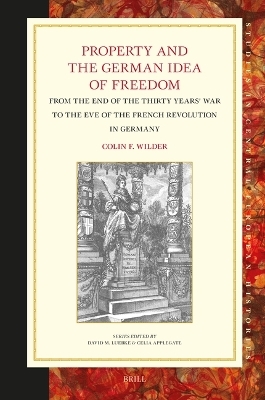
Property and the German Idea of Freedom
Brill (Verlag)
978-90-04-68516-1 (ISBN)
This book offers a new interpretation of German law and politics during the era between the Thirty Years’ War and the French Revolution. Liberal ideas of freedom and equality were prototyped in Germany in property law: through the free disposition of estates, freedom from taxation and other extractions, and free use of paper money. Civil liberty, ideas about equality, and restrictions on arbitrary state power were real, recognized, and meaningful. These freedoms were enjoyed by all classes of Germans. They were thought to have been built atop Germans’ ancient heritage of freedom and a federalist imperial constitution which inspired Montesquieu and the American Founders. Driving these trends were ideas about political economy, enlightened reform, practical problem-solving, as well as forces of supply and demand in everything from the market for books to the market for justice. This book places the story of early modern German freedom close by the side of more familiar stories of England, North America, France, and the Netherlands.
Colin F. Wilder, Ph.D. (2010), University of Chicago, is Assistant Professor of German and Digital History at the University of South Carolina.
Contents
Preface
Acknowledgements
List of Figures
1 Introduction
1 The Consensus and Revisionist Views of German Freedom
2 This Book’s Contribution
3 Legal Operators
4 Significance
5 Context
6 Commercialization
7 Political Economy
8 Sources
2 The Core Stories and Ideas of German Freedom
1 Ancient Germanic Freedom
2 The Free German Empire
3 German Freedom
3 Idea-Generative Institutions
1 State Expansion
2 Courts
3 Supply, Demand, Population, and Commercialization
4 Universities and Law Faculties
5 Jurists
6 Books
4 Free Disposition of Estates
1 Chaos, Information Loss, and Self-Release
2 Missing Money and Missing Records
3 Tithe Conversion and Disposal
4 Methods of Self-Release: The Claim of Allodial Property
5 Models of Allod
6 Circumventing Requirements through Legal Fictions
7 Retraction Law
8 Accepting the Results of Free Activity after the War
9 The Princely Resolutions of 1655
5 Freedom from Extractions
1 Noble Trespassing and Evasions
2 Tax Registration, 1651–1654
3 The ‘Graying’ of the Clear Cadastral Picture
4 New Departures in the 1680s
5 The Presumption of Natural Freedom
6 The Regalianism of Christian Thomasius
7 Regalian Rights
8 Regalia as Imprescriptible
9 Too Machiavellian?
6 Free Use of Paper Money
1 Paper Money, Bills of Exchange, and Political Economic Ideas
2 Evolution of the Law of Exchange in Europe
3 The Political Economy of German States after 1648
4 Adoption of the Law of Exchange Throughout the Empire
5 Summary Procedure and Strict Liability (“Rigor”)
6 Regional Finance in the Seventeenth Century
7 New Directions in the Eighteenth Century
8 Variations on the Theme
9 Reconciling Conflicting Law, 1732–1749
7 Conclusion
1 Property Rights and Freedom in Early Modern Germany
2 Free Disposition of Estates
3 Freedom from Extractions
4 Freedom and the Use of Money
5 German Freedom
6 The Extension of Positive and Negative Civil Liberties
7 Cooperation, Competition, and Conflict
8 The One and the Many
Glossary
Bibliography
Index
| Erscheinungsdatum | 28.12.2023 |
|---|---|
| Reihe/Serie | Studies in Central European Histories ; 75 |
| Verlagsort | Leiden |
| Sprache | englisch |
| Maße | 155 x 235 mm |
| Gewicht | 765 g |
| Themenwelt | Geisteswissenschaften ► Geschichte ► Regional- / Ländergeschichte |
| Geschichte ► Teilgebiete der Geschichte ► Militärgeschichte | |
| Geschichte ► Teilgebiete der Geschichte ► Wirtschaftsgeschichte | |
| Recht / Steuern ► Rechtsgeschichte | |
| ISBN-10 | 90-04-68516-2 / 9004685162 |
| ISBN-13 | 978-90-04-68516-1 / 9789004685161 |
| Zustand | Neuware |
| Haben Sie eine Frage zum Produkt? |
aus dem Bereich


